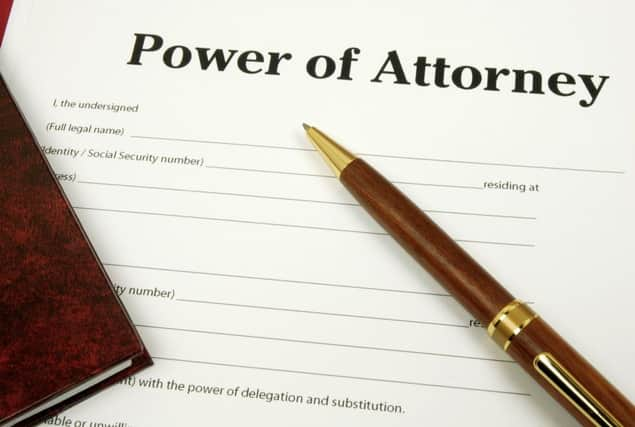Where there's a will, have a Power of Attorney too


The second is a new function of authorising a named person or persons to be concerned with and even to make decisions in relation to the personal affairs and health and welfare of the person granting the PoA.
When these provisions came into effect initially, there was considerable doubt whether a family member or other trusted person who had no particular expertise in health and welfare matters was an appropriate recipient of these new powers.
Advertisement
Hide AdAdvertisement
Hide AdHowever, this facility turned out to be a self-fulfilling prophecy because of a growing tendency at places such as hospitals and care homes for personnel to insist on sight of a PoA before discussing a patient’s circumstances.
It appears the appropriate advice now is that, along with writing a will, a client should also complete a PoA incorporating both of the above functions.
In most cases, the PoA is created to provide for the appropriate authority to operate in the absence of the capacity, usually through ill-health, of the person granting the PoA to conduct his or her own affairs. In order for the PoA to have that effect, it must be registered at the Office of the Public Guardian (OPG) which currently incurs a fee of £74.
Of course, the granter may wish to be certain the PoA will not come into effect while he or she remains able to conduct his or her own affairs. They may wish to consider the inclusion of what are known as springing clauses, such as the certification of incapacity by a medical practitioner as a pre-condition of the validity of the PoA. Such clauses seem to me to be counter-productive.
In the first place, if a person trusts their attorney to act appropriately in the granter’s incapacity, why should that attorney not be trusted not to abuse the PoA while the granter retains capacity?
Secondly, it is often the case that when a PoA is required, it is needed as a matter of urgency and the delay involved in convening an examination and obtaining certification may well frustrate the urgent operation of the PoA.
Thirdly, any requirement to scrutinise documentation external to the PoA involves the making of a value judgment by the scrutiniser as to whether that external document meets the requirements specified in the PoA.
I have found from practical experience of the operation of PoAs that the document should ideally stand alone without any requirement for reference to additional, external documentation ie no springing clauses.
Advertisement
Hide AdAdvertisement
Hide AdFinally, many persons might see the PoA as a legal document which should be drawn up on legal advice by a solicitor, but PoAs do not fall within the ambit of work legally reserved to solicitors and there are now numerous agencies who undertake the preparation of PoAs under guise of being lawyers or law firms but not as solicitors. Customers, we have found, may nevertheless assume solicitor involvement.
The one way to ensure that your PoA is drawn up under Scots law and at a standard ensured by the professional discipline, the guarantee fund and the professional indemnity operated by the Scottish solicitors’ profession, is to insist that whoever provides the service is, in fact, a Scottish solicitor.
It is a well known adage of professional practice that a solicitor should know his or her client and it is equally advisable that the client should always know that he or she is dealing with a Scottish solicitor.
Michael Sheridan is secretary, Scottish Law Agents Society